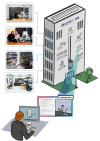Differences
This shows you the differences between two versions of the page.
| Both sides previous revisionPrevious revisionNext revision | Previous revisionNext revisionBoth sides next revision | ||
| teaching:gsoc2018 [2018/01/21 20:28] – balintbe | teaching:gsoc2018 [2018/01/21 20:44] – [Topic 1: Multi-modal Cluttered Scene Analysis in Knowledge Intensive Scenarios] balintbe | ||
|---|---|---|---|
| Line 74: | Line 74: | ||
| **Contact: | **Contact: | ||
| + | |||
| + | |||
| + | ==== Topic 2: Felxible perception pipeline manipulation for RoboSherlock ==== | ||
| + | |||
| + | {{ : | ||
| + | |||
| + | **Main Objective: | ||
| + | |||
| + | **Task Difficulty: | ||
| + | | ||
| + | **Requirements: | ||
| + | |||
| + | **Expected Results:** an extension to RoboShelrock that allows splitting and joingin pipelines, executing them in parallel, merging results from multiple types of cameras etc. | ||
| + | |||
| + | Contact: [[team/ | ||
| + | |||
Prof. Dr. hc. Michael Beetz PhD
Head of Institute
Contact via
Andrea Cowley
assistant to Prof. Beetz
ai-office@cs.uni-bremen.de
Discover our VRB for innovative and interactive research

Memberships and associations:











